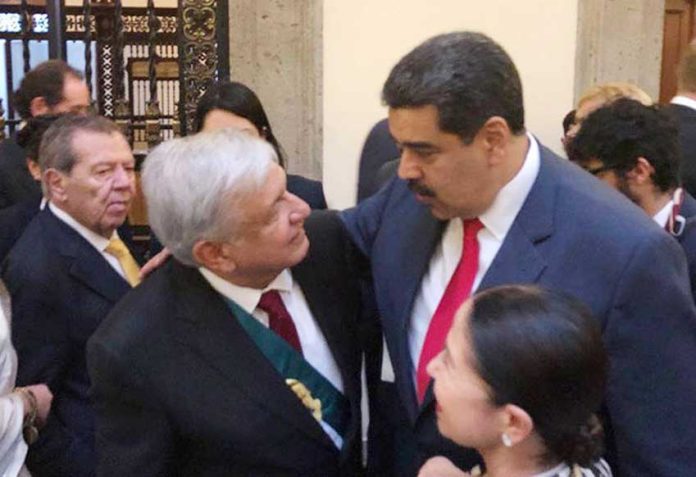Mexico was the only country in a multilateral regional group that didn’t add its voice to a declaration urging Venezuelan President Nicolás Maduro not to take office for a second term on January 10.
Following a meeting in Lima, Peru, 13 of the 14 member countries of the Lima Group said in a statement that they would “not recognize the legitimacy of the new presidential term” because of irregularities in last year’s election.
“The electoral process carried out in Venezuela on May 20, 2018, lacks legitimacy due to the lack of participation of all Venezuelan political actors, without the presence of independent international observers, or the guarantees and standards necessary for a free, fair and transparent process,” the statement said.
The 13 nations urged Maduro to hand over power to the opposition-controlled National Assembly until new democratic presidential elections are held and said that “in accordance with what is allowed by internal laws” high-ranking Venezuelan officials will be barred from entering Lima Group countries.
United States Secretary of State Mike Pompeo participated in yesterday’s meeting by video conference after visiting South America earlier in the week and discussing the situation in Venezuela with the governments of Colombia, Peru and Brazil.
Millions of Venezuelans have fled the country in recent years amid political repression, human rights abuses, skyrocketing inflation and severe food and medicine shortages.
It is the first time that Mexico hasn’t supported a declaration by the Lima Group, which was created in August 2017 to push for democratic reforms in Venezuela.
The previous Mexican government was an outspoken critic of Maduro but President López Obrador has adopted a policy of non-intervention towards Venezuela.
He also invited Maduro, who became president of the South American nation after Hugo Chávez’s death in 2013, to attend his inauguration as president on December 1.
The deputy foreign secretary for Latin America, Maximiliano Reyes, who represented Mexico at yesterday’s Lima Group meeting in Peru, said the federal government is concerned about the “peace and prosperity of the Venezuelan people” as well as the “situation regarding human rights” but would not comment on the legitimacy of the Venezuelan government.
He proposed that the Lima Group rethink its approach to dealing with Venezuela.
“We call for reflection in the Lima Group about the consequences for Venezuelans of measures that seek to interfere in internal affairs,” Reyes said in a speech at yesterday’s meeting that was subsequently published online by the Secretariat of Foreign Affairs (SRE).
“Mexico believes that the most effective way to reach the objectives for which this group was created is through initiatives of mediation and dialogue, not isolation . . . Mexico will maintain diplomatic relations with Venezuela in order to be able to consider with interest the proposals of action or diplomatic steps that the different political and social forces of that country formulate . . .” he continued.
“The Mexican government, in faithful pursuit of its constitutional principles of foreign policy, will refrain from issuing any kind of pronouncement regarding the legitimacy of the Venezuelan government,” Reyes said.
“Self-determination . . . and non-intervention are constitutional principles that Mexico must follow . . . Promoting dialogue between parties to find a peaceful situation to the situation that Venezuela is going through will continue to be a priority of Mexico’s foreign policy. Therefore, on this occasion, Mexico will not support the text . . .”
The deputy foreign secretary concluded by saying that Mexico would remain part of the Lima Group but stressed that “our bet is for diplomacy.”
Other members of the group are Argentina, Brazil, Canada, Chile, Colombia, Costa Rica, Guatemala, Guyana, Honduras, Panama, Paraguay, Peru and Saint Lucia.
Venezuelan Foreign Minister Jorge Arreaza said in a state television broadcast last night that Maduro will begin his second term as president on January 10 in a “legitimate and constitutional” process that “does not require the approval of any foreign government.”
Despite the warming of relations between Mexico and Venezuela, President López Obrador will not return the favor of traveling to Caracas for Maduro’s inauguration nor will a high-ranking member of his government be in attendance.
A spokesman for the Secretariat of Foreign Affairs said the Mexican embassy’s charge d’affairs would represent the government at the ceremony.
In Ciudad Juárez, Chihuahua, today, López Obrador said he supported the decision taken by Mexican diplomats in Peru yesterday.
“We’ve said with a lot of clarity that we’re going to respect the constitutional principles of non-intervention . . . in foreign policy matters. We don’t interfere in internal matters of other countries and we don’t want the governments of other countries to meddle in matters that correspond only to Mexicans,” he said.
Source: El Universal (sp), El Financiero (sp), Reuters (en), Milenio (sp)
